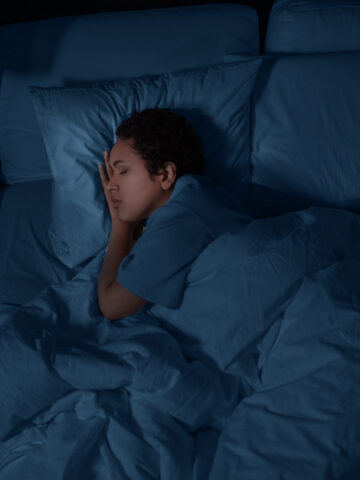By Dr. Reshmi Basu, a CHOC Children’s pediatrician
All parents have been there― it’s late at night, you’ve had a long day, and you’re struggling to get your child to go to sleep. I’m also a mom, and I’ve had plenty of those nights in my household too. Here’s my best advice as a pediatrician on getting your child to go to sleep.
Know how much sleep your child should be getting
Sleep requirements change with age, so it is important to know what is appropriate as your child grows. However, remember these are ranges and each child is different. Talk to your pediatrician about how much sleep your child needs.
These are ranges for hours of sleep in a 24-hour period, including naps.
- 0-2 months: 9-18 hours
- 2-12 months: 12-13 hours
- 12 months-3 years: 11-13 hours
- 3-5 years: 11.5-12 hours
- 6-12 years: 9-10 hours
- 12-18 years: 8.5-9.5 hours
Behavioral problems can often be associated with inadequate sleep. And sleep can even affect weight. One study showed that putting preschoolers to bed early is associated with lower risk for adolescent obesity.
Stick with a routine
A consistent routine is important no matter the age of your child. If possible, keep the same routine on weekdays and weekends, with a similar bedtime and wake time—even if they don’thave to get up early for school the next day. This may become a challenge in the teen years where teenagers will try to catch up on sleep on weekends, that can actually cause other problems such as insomnia.
In younger kids, naps are essential.However, it’s best to avoid naps late in the day that can interfere with bedtime. And although short naps, like a quick snooze in the car, can restore alertness for a short time, it is the longer naps that have a more long-term restorative function. Do your best to schedule naptime in the early afternoon even on busy weekends.
Reduce stimulation prior to bedtime
Try to encourage calming and relaxing activities prior to bedtime. Limit very active play just prior to bed. Do your best to limit screen use before bedtime. This includes limiting screens in the evening and keeping all media devices out of the bedroom, especially after lights out. Never use electronics as a sleep aid.
Be careful of sleep associations
As infants get older, avoid activities such as nursing or rocking to sleep because they may require the same during nighttime awakenings instead of being able to soothe themselves back to sleep. Studies have found that gradually delaying infant’s bedtime or parents’ response to infant’s crying improves sleep and is not associated with increased stress or emotional problems. School-aged children who require a parent to be present at sleep onset are more likely to wake up during the night. Some sleep associations, however, can be helpful and do not require parental intervention, such as a favorite teddy bear or blanket.
Watch out for sleep disorders
Sleep disorders in children and adolescents include obstructive sleep apnea, sleepwalking, sleep talking, night terrors and insomnia. These may lead to excessive daytime sleepiness, irritability and even learning difficulties in school. If your school-aged child is napping, dozing off on short car rides or while watching TV, then tell her doctor. Loud snoring or restless sleep can also be a problem and should be discussed with your child’s doctor.
Create an ideal sleep environment
Your child’s bedroom should be kept cool, dark and quiet. Consider blackout curtains to avoid direct light exposure in the bedroom during the night. A night light may help your school-aged child with nighttime fears. Remember crib safety for your infant and that it is not safe to continue swaddling after 4-6 months or earlier if the baby is trying to turn over. For teenagers, encourage them not to use their bed for activities other than sleeping (i.e. watching TV or using electronic devices).
Remember good habits during the day
Healthy habits during the day will translate to healthy sleep at night. This includes adequate stimulation for infants and regular exercise for older children. Avoid skipping meals—especially breakfast―offer healthy snacks and avoid large meals just before bed.
For more health and wellness resources from the pediatric experts at CHOC, sign up for the Kids Health newsletter.
Find a CHOC Primary Care Pediatrician
From babies to teens, pediatricians from CHOC’s Primary Care Network partner with parents to offer immunizations, sick visits, sports physicals and more.





